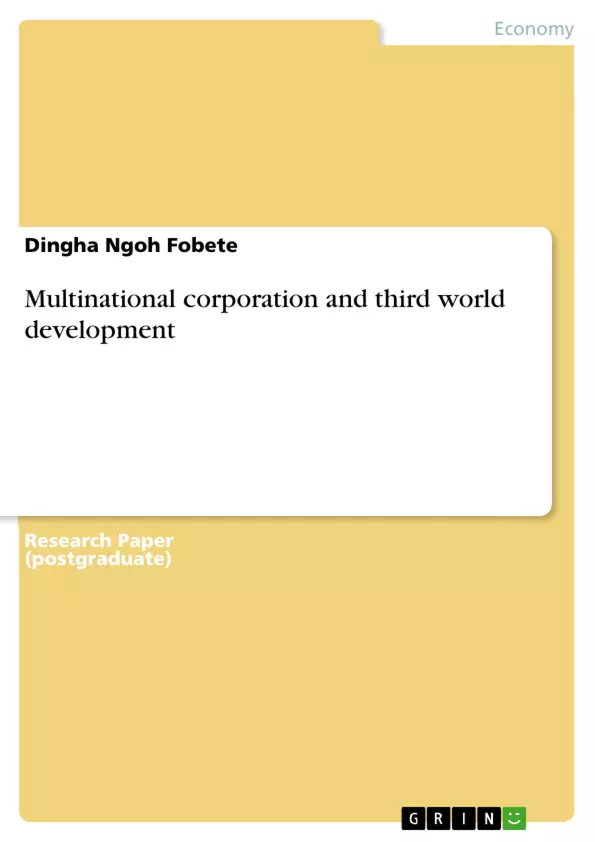Multinational Corporations (MNC) are important transitional agents in the contemporary global political economy. Although they can be viewed as economic actors following the logic of international market, their activities inevitably arouse questions of national power. Not surprisingly, such questions are most pronounced in the study of developing countries where weak government and societies potentially give the MNC strong bargaining position. Thus, the nature of their relationship between developing countries and the implication of this relationship for economic growth remains highly controversial. How ever, proponents of MNC posit in the past that MNC have made important contribution to developing countries. This interaction between MNCs and third world economy has led to a profound relationship whose impacts are enormous. Although many scholars have written more on the impact of MNC on host less developed countries, the most important question is, Do foreign firms behave differently from locally owned firms and if so what are their implication?
Multinational corporations are one of the main conduits through which investment is channelled and their evolution has reflected broader developments (OECD 2003).
This impact however will be examined from the negative and positive impact gearing towards the development of third world. However it is imperative to examine the characteristics of developing countries as well as some objectives of Multinational Corporations (MNC).
Table of Contents
- Multinational Development Corporations and Third World
- Characteristics of Developing Countries
- Objectives of MNC
Objectives and Key Themes
This work examines the relationship between multinational corporations (MNCs) and developing countries, focusing on the impact of MNCs on the third world. The primary objectives are to analyze the characteristics of developing countries, the goals of MNCs, and the potential positive and negative effects of MNC activities in developing economies.- The impact of MNCs on developing countries
- Characteristics of developing countries and their challenges
- Objectives of MNCs and their strategies in developing countries
- Potential positive and negative consequences of MNC activities
- The role of foreign direct investment (FDI) in promoting development
Chapter Summaries
- Multinational Development Corporations and Third World: This introductory chapter sets the stage by explaining the significance of MNCs in the global political economy and highlighting the controversy surrounding their relationship with developing countries. It emphasizes the potential for MNCs to influence national power, especially in countries with weak governments and societies.
- Characteristics of Developing Countries: This section explores the defining features of developing countries, highlighting their economic and political vulnerabilities. It discusses poverty, limited resources, political instability, and challenges to economic efficiency, drawing on insights from prominent economists like Krugman and Obsfeld.
- Objectives of MNC: This chapter focuses on the primary goals of MNCs, particularly profit maximization. It examines how MNCs seek to capitalize on low production costs in developing countries and their significant role in international trade and investment.
Keywords
This work centers around the relationship between multinational corporations (MNCs), developing countries, and the third world. Key themes include the impact of foreign direct investment (FDI), the role of MNCs in promoting economic growth and development, the characteristics of developing countries, and the potential positive and negative consequences of MNC activities in less developed nations.- Quote paper
- Dingha Ngoh Fobete (Author), 2005, Multinational corporation and third world development, Munich, GRIN Verlag, https://www.grin.com/document/115655




